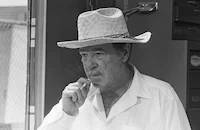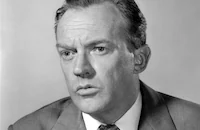Claudelle Inglish

Brief Synopsis
Cast & Crew
Gordon Douglas
Diane Mcbain
Arthur Kennedy
Will Hutchins
Constance Ford
Claude Akins
Film Details
Technical Specs

Synopsis
Claudelle Inglish, the teenage daughter of a Georgia sharecropper, is in love with Linn Varner, a farmboy. Claudelle's mother, Jessie, all too aware of her own drab existence, tries to discourage the romance by urging Claudelle to marry S. T. Crawford, an older, wealthy farmowner. But Claudelle refuses, and she remains faithful to Linn even when he is drafted into the Army. When he writes that he is planning to marry someone else, however, Claudelle brazenly turns into the town trollop. Her first affair is with Dennis Peasley, whose father owns the general store. Dennis falls in love with her, but Claudelle begins "accepting gifts" from most of the other men of the town, including Dennis' father. When Clyde Inglish, Claudelle's father, learns of his daughter's reputation and accuses her of being a tramp, Claudelle angrily confronts him with the news that Jessie has been seen making love to S. T. Crawford in a parked car. A short time later, Dennis and local tough Rip Guyler come to blows over Claudelle. Their bloody fight ends in death when Rip runs his car into the hysterical Dennis. The next morning, a repentant Claudelle tells her father that Jessie has left home. Sobered by the news, father and daughter decide to move away and begin a new life. But Harley Peasley, deranged by his son's death, arrives at the Inglish farm, corners Claudelle, and shoots her. Clyde rushes into the house and embraces his daughter as she dies.

Director

Gordon Douglas
Cast

Diane Mcbain

Arthur Kennedy

Will Hutchins
Constance Ford

Claude Akins

Frank Overton

Chad Everett
Robert Colbert
Ford Rainey
James Bell
Robert Logan
Jan Stine
Hope Summers
Crew
Gordon Bau
Malcolm C. Bert
Folmar Blangsted
Leonard Freeman
Leonard Freeman
Howard Jackson
Alfred E. Kegerris
William Kissel
Jean Burt Reilly
Howard Shoup
Francis M. Stahl
Ralph Woolsey

Film Details
Technical Specs

Award Nominations
Best Costume Design
Articles
Claudelle Inglish
Tagline for Claudelle Inglish
Ever since William Fox turned Theodosia Goodman of Avondale, Ohio, into Theda Bara, the movies have been in love with bad girls. And from Bara's star-making vehicle through Bette Davis's 1949 Beyond the Forest, Joan Crawford's 1955 Queen Bee and Sharon Stone's 2006 Basic Instinct 2, they've loved them most when they starred in the trashiest movies. Bad movie bad girls have a cult following all their own, devoted to the over-hyped sexuality, preposterous plots and laughable dialogue. In Warner Bros. 1961 Erskine Caldwell adaptation Claudelle Inglish, Diane McBain got to play one of the best, meaning one of the worst.
In many ways, the film was a bad-girl take on Warners' scandalous 1956 hit Baby Doll. Like Carroll Baker, who had recently left the studio, McBain played a child-woman in search of empowerment. But where Baker, in what had amounted to a delightfully ribald fable, found her power by rejecting her possessive, bigoted husband for a more female-friendly Italian vineyard owner, McBain sought it by taking every man she could to the cleaners. Where Baker won in the end by finding her power, McBain had to pay for hers, a lesson for wicked women everywhere, particularly those given to tight dresses and painted lips. And where Baker got to perform a script by Tennessee Williams adapted from two of his short plays, McBain was stuck in a turgid adaptation of one of Caldwell's lesser works.
Caldwell's 1958 novel came out long after his heyday, when he burned up the best seller lists with steamy sagas like God's Little Acre and Tobacco Road and won acclaim with Depression-era photo-documentaries like You Have Seen Their Faces. The tale of a share-cropper's daughter who turns into the town tramp after getting a "Dear Jane" letter from her poor but honest true love was lambasted for similarities to his earlier novel Gretta and dismissed by one critic with "'Tis a pity she's a bore." Warner Bros. saw big-screen possibilities in it nonetheless, so they sunk $25,000 into promoting the book, a campaign that actually doubled hard-back sales. They also picked up the screen rights, guaranteeing Caldwell 25 percent of the gross.
Warners assigned the title role to Diane McBain, a Cleveland-born actress whom one of their talent agents had spotted on stage while she was still in high school. After playing a rich vixen out to seduce Troy Donahue in Parrish (1961) and daffy party girl Daphne Dutton on the series Surfside 6, she was assigned her first big-screen lead, as the down-home doxy who teases a pair of red shoes out of local landowner Claude Akins, gets a new wardrobe out of the rest of the town's businessmen and inspires a fatal battle between two younger suitors.
The rest of the cast of Claudelle Inglish was comprised of young contract talent (Warners was one of the last Hollywood studios to maintain a sizable talent roster, mostly comprised of young men and women) and more experienced talent. Among her suitors were Will Hutchins, star of the studio's Sugarfoot series, Robert Colbert, later the star of The Time Tunnel, and, in his film debut, Chad Everett. All those youthful good looks were balanced by seasoned vets in the other roles, particularly five-time Oscar® nominee Arthur Kennedy as her honest father and future soap opera superstar Constance Ford as her greedy, lustful mother, who tries to match her with Akins, then runs off with him herself.
Warners couldn't have been all that impressed with the results, as the film was released directly to neighborhood houses, where it played on a double bill with the World War II film The Steel Claw (1961), starring George Montgomery. Nor was it particularly well-received by the press, with the New York Times' Bosley Crowther stating it took place "on a farm on a Warner sound stage where the principal crop is clearly corn...life can be hideous down on a Warner sound-stage farm." Nonetheless, the studio promoted it into an Oscar® nomination for Best Black-and-White Costume Design and it took in a then-respectable $3.5 million, with studio bookkeepers miraculously turning one quarter of that into $158,000 when it came time to pay Caldwell.
Yet with its overripe dialogue and situations, Claudelle Inglish was one bad girl they couldn't keep down. Today, it's considered a sleazy delight, with scenes once played seriously now viewed as high camp. Then again, what else can an audience do when confronted with lines like Akins's appreciation of McBain's feminine allure: "You're kinda flowering all over like a pretty peach tree." One suitor wins a "date" with Claudelle with what most would consider one of the all-time worst pick-up lines: "You're not the marrying kind." And in the film's big finale, a former suitor confronts her with "You're still alive, with your painted lips and your wickedness." They're the kind of lines that could only work dramatically as inter-titles on a silent film. Spoken aloud, they turn a throwaway soap opera into a true cult classic.
Producer: Leonard Freeman
Director: Gordon Douglas
Screenplay: Leonard Freeman
Based on the novel by Erskine Caldwell
Cinematography: Ralph Woolsey
Score: Howard Jackson
Cast: Diane McBain (Claudelle Inglish), Arthur Kennedy (Clyde Inglish), Will Hutchins (Dennis Peasley), Constance Ford (Jessie Inglish), Claude Akins (S.T. Crawford), Frank Overton (Harley Peasley), Chad Everett (Linn Varner), Robert Colbert (Rip Guyler), Ford Rainey (Reverend Armstrong), Max Showalter (Young Parson), Hope Summers (Ernestine Peasley).
BW-100m.
by Frank Miller

Claudelle Inglish
Quotes
Trivia
Notes
Location scenes filmed in northern California.

Miscellaneous Notes
1961 Academy Award Nomination for Best Costume Design (b&w)
b&w













